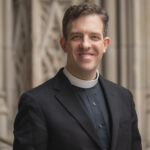
Raising two young boys has had me in consistent wonder at the bright power of their imaginations. If one dares to listen and then “go along for the ride” in conversation, the imagination of a young child is so unbound and free that I often find myself laughing in delight at their playful insights. They seem to spring out of nowhere, ex nihilo. But, in fact, their accidental poetry is no accident at all. After all, lightning really does look like a “glow tree.” And, I have to admit, a partial eclipse really is a “crescent sun.” But I wouldn’t have known that if they hadn’t shown me. The connections and the fruitful juxtapositions that they declare were there all along. They are experiencing life anew, making sense of it day by day, unbridled by the expectations and limitations that my so-called “experience” has imposed on the world. More often than I care to admit, I’m the one with the blinders, and they are the ones who truly see.
This insight of children brings to mind J.R.R. Tolkien’s defense of “fantasy stories,” which he felt were uncharitably scorned as “escapist”:
Why should a man be scorned if, finding himself in prison, he tries to get out and go home? Or if, when he cannot do so, he thinks and talks about other topics than jailers and prison-walls? The world outside has not become less real because the prisoner cannot see it.
In his poem “Mythopoeia“. Tolkien speaks of the capacity to see beyond mere labels and functions—to recognize the living, breathing essence of the world around us. To look at trees and not merely see “trees,” but to engage with them as part of a dynamic, enchanted, “God-breathed” reality. Such a commitment is not about escaping the world but about perceiving its deeper truths from a higher vista.
The act of naming, Tolkien argues in his poem, is not a mere act of labeling but an act of renewal, a way of participating in God’s creation itself. When my boys imagine their toys coming to life or their floor is now a lava-covered quest, they are engaging in this primal act of creation. They are participating in the divine image, reflecting the creativity of God. Thanks to my boys, I’m friends with an orange squid named Walter who has a mother who loves him. I’m also friends with a large snake named Sassafras, as well as an invisible giant named Tina. Their characters, stories, and play that even an adult can join are forms of what Tolkien calls “sub-creation,” a way in which human beings, made in the image of the Creator, can reflect the divine act of making. As Tolkien wrote in Mythopoeia, “we make by the law by which we’re made.”
The Incarnation itself is God’s ultimate act of imagination—God becoming human to dwell among us. Christ invites us to see the world through this lens of divine possibility animated by the Holy Spirit who moves in ways we typically cannot predict or control. Our long-cherished sacramental vision of reality proclaims that the material world is seen as a conduit of divine grace. The liturgy of Saint Thomas, with its eloquent scriptural, musical, and architectural symphony, draws us into this imaginative engagement with God’s world. The Mass, in particular, ordinary bread and wine becoming the body and blood of Christ, is a profound act of divine imagination that not only transforms our understanding of reality but transfigures reality itself. In this sacrament, we are reminded that God’s presence permeates the world, inviting us to not only see with new eyes, but live with new lives, even in the midst of our limits.
In adult life, where the imagination is often stifled by utilitarian schemes and pragmatic dreams, there is a great need to reclaim this vision. The imagination is not merely a tool for entertainment or escape but a vital part of our spiritual life. It allows us to see the world as God intends, to hope for what is not yet seen, and to experience the kingdom of God as a reality that is not just coming, but already there. In going along with the imaginations of my young boys, I am more open to the surprises of grace that God weaves into the fabric of our daily lives.
“The world is charged with the grandeur of God,” as Gerard Manley Hopkins wrote. To play as a child is to glimpse the glory hidden in the ordinary, and to participate in the ongoing act of Creation. Can we be brave enough to affirm that our cherished stories and our beloved imaginings and games are not mere flights of fancy, but signs of a deeper reality: God in the midst of it all, walking with us, making all things new?
Matthew Moretz+
Vicar

